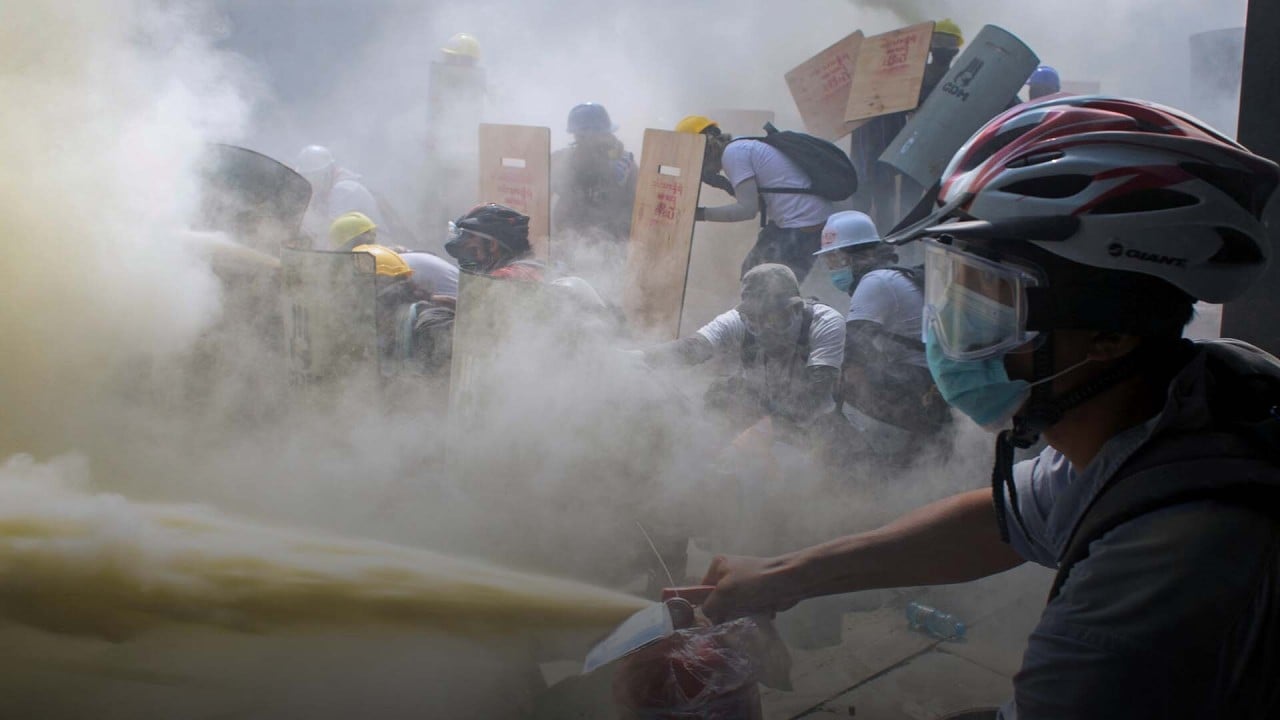
Asean foreign ministers to meet Myanmar military on Tuesday, Singapore confirms
- Top diplomat Vivian Balakrishnan says the 10-member bloc can still play a role in facilitating ‘a return to normalcy and stability in Myanmar’
- On the US-China rivalry, he says it is ‘inevitable that we will feel that type of great power competition from time to time’ given Singapore’s ‘deep friendship’ with both
“We believe in engagement and dialogue in good faith with all relevant stakeholders. A special Asean foreign ministers’ meeting will be convened by video conference tomorrow and where we will listen to the representatives of the Myanmar military authorities,” Balakrishnan told lawmakers in the island nation’s parliament as part of the debate on the foreign ministry’s upcoming budget.

03:56
Myanmar police kill at least 18 in deadliest anti-coup protests yet, UN Human Rights Office says
The Singapore foreign minister’s comments came a day after the Myanmar police fired on protesters around the country, killing at least 18 people and wounding more than 30. It was the bloodiest day of protests since its generals seized power in a February 1 coup and detained elected leaders, including Nobel laureate Suu Kyi.
Balakrishnan on Monday said he was “appalled” by the violence, reiterating earlier comments that the use of lethal weapons against unarmed civilians was “inexcusable in all circumstances”.
“We call on the Myanmar military authorities to exercise the utmost restraint, to desist from the use of lethal force, and to take immediate steps to de-escalate the situation in order to prevent further bloodshed, violence and death,” he added. “Prolonged instability in Myanmar will have serious consequences for Myanmar, for Asean and across our region.”
Singapore, the top source of foreign direct investment in Myanmar, has faced increasing pressure in recent weeks over its links to the junta.
Anti-coup protesters last month gathered outside the island nation’s embassy in Yangon to demand that it “be a good neighbour” and compel army chief Min Aung Hlaing to end the crackdown on demonstrators. They have also called for a boycott of Singapore businesses such as restaurant chains Ya Kun Kaya Toast and Crystal Jade Kitchen.

Meanwhile, Malaysia on Monday said Asean must play a more proactive role in bringing normalcy back to Myanmar.
In a statement, foreign minister Hishammuddin Hussein said all parties “must exercise utmost restraint from the use of violence”, and that Malaysia supported the convening of an informal Asesan ministers’ meeting to discuss the situation in Myanmar.
In Singapore, while speaking to parliament, Balakrishnan also touched on how Singapore would navigate the heightened US-China rivalry. He noted that the city state’s long-standing relationship with the US included cooperation in defence, security, economics, and education, and pointed out that about 85 per cent of American investments in Southeast Asia were in Singapore.
“The US military presence has underpinned peace and security in our region for over half a century,” Balakrishnan said.
Meanwhile, he said Singapore shared a “deep historical, cultural, linguistic legacy” with China, which he noted was the island nation’s largest trading partner. He added that Singapore would continue to strengthen its existing collaboration with Beijing and look for new opportunities with the country.
“When the chips are down on either side, fortunately at different times, we stepped up and helped. And that‘s how you build trust,” Balakrishnan said. “Given our deep friendship, our investments with both the US and China, it is inevitable that we will feel that type of great power competition from time to time. We must expect this. We must not be upset or panic whenever we feel these tugs.
“In fact, I would say this is a design feature of the way we engage the two superpowers. It is normal for two superpowers to try to influence others into their way of thinking, particularly if we are considered to be important accounts worth pushing and pulling.”

